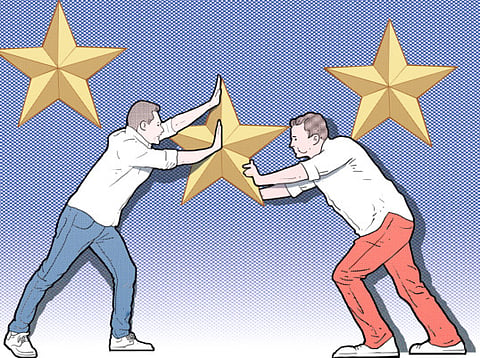A split EU will greatly benefit Russia
Moscow and the bloc have proved unable to find a mutual route to normal co-existence

Russian President Vladimir Putin will be watching today’s British referendum on European Union (EU) membership with particular care. And no doubt those Latvians, Estonians and Ukrainians who are Europhile are also watching the referendum very carefully. They are fully aware of the problem of having a large Russian minority, while also being a neighbour to modern Russia.
Putin will be delighted with a British decision to leave as that will lead to a wave of uncertainty across Europe. If the EU starts to fray around the edges, and lose what limited unity it has in foreign policy, Russia will find several ways to take advantage of the situation. Russia needs to rebuild a new global role for itself, but is finding it hard to deliver very much outside its immediate neighbourhood — thanks to the collapse in the oil price — other than Russia’s backing for President Bashar Al Assad in Syria, which has largely been limited to providing air support for regime ground forces. This intervention has had a great effect on the confused Syrian civil war and given Putin considerable political rewards as Russia now has to be taken into account in any plan to end the Syrian war.
But the experience of Abkhazia in 1993, South Ossetia in 2008, Crimea in 2014, followed by a lingering stalemate in eastern Ukraine, makes it hard to know what Russia will do next. The Latvians are all too aware that they have more than 550,000 ethnic Russian citizens, who make up 27 per cent of the population. The Estonians have 320,000 ethnic Russians, making up 24 per cent of their population and the Lithuanians will be more relaxed because they only have 170,000 ethnic Russians who are less than 5 per cent of their population.
These Baltic states have been horrified by events in Ukraine since 2014. They rely on the economic and social benefits of membership of a strong EU to offer them a way forward to a better future and they see no future in following the disastrous example of Belarus. They have their ultimate guarantee of their Nato membership, but things will have to go very badly wrong to require Nato forces in the Baltic states.
Sanctions
Putin used last week’s St Petersburg Economic Forum to speak out on his global vision. Given Russia’s continued actions in Ukraine, the Europeans at the forum refused to give Russia any concessions and Brussels renewed the EU sanctions against Russia for another six months. Putin is skilled at riding out such crises and he continues to watch if the EU will manage to build an effective plan of action.
Meanwhile, Putin opened up new lines of thought with his would-be peers in the United States and China. He tried a new approach to Washington by being refreshingly blunt about the US when he said “America is a great power. Today, probably, the only superpower. We accept that”. And he went to say that “we want to and are ready to work with the United States”. US President Barack Obama was at pains to make clear that the US remains committed to the joint EU-US sanctions. No doubt Obama spotted Putin’s further remarks saying of the Americans that “we don’t need them constantly getting mixed up in our affairs, instructing us how to live, preventing Europe from building a relationship with us”.
So, while watching Europe and rebuffed by the US, Putin is looking to strengthen his relations with China. Only 48 hours after Brussels extended its six-month sanctions on Russian energy and financial firms, Putin announced that he would use the June 23-24 Shanghai Cooperation Organisation Summit in Tashkent to meet with Chinese leader Xi Jinping to discuss “practical measures to further strengthen ties”. He hopes to find a collaboration between China’s One Belt One Road trade and economic initiative and Russia’s plans to build new economic prosperity in Asia.
Putin will see if China wants to join the five-member Asian trade bloc of the Eurasian Economic Union, which includes Russia and other ex-Soviet states, including Kazakhstan and Belarus. China sees a use to this new proposal as it will want to sell its current oversupply in coal and steel.
China will also remember its recent moves to build pipelines and secure more long-term supply of energy from the oil-rich Central Asian republics with eager Russian support in Moscow. But deep down, Beijing knows that its economy has much deeper ties with the US than Russia, despite the military tensions in the South China Sea, which forces Putin back to thinking about his European neighbours, and what they will do about the British vote.


